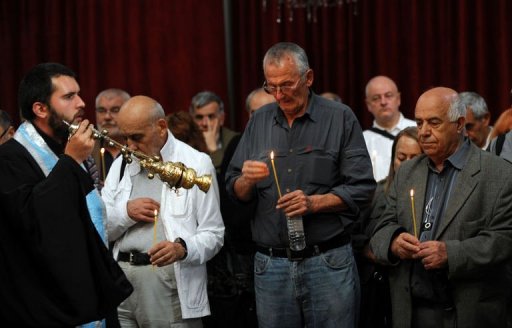The killing of Bulgarian dissident Georgy Markov with a poison-tipped umbrella on a London bridge in 1978 was like an episode from the pages of a Cold War spy novel.
But this was not fiction. And now, 35 years later, Bulgarian investigators are closing the book on their probe, even though Markov’s cousin says he knows who the killer was — and where he lives.
The statute of limitations, she said, expired on September 11, the 35th anniversary of Markov’s death.
The prominent journalist and playwright had fled communist Bulgaria in 1969 but lambasted the regime in reports for the BBC and Radio Free Europe.
On London’s Waterloo Bridge on September 7, 1978, he was jabbed in the leg by a passer-by and later told his family that he saw this person drop his umbrella.
Markov, 49, developed a high fever and died in hospital four days later. An autopsy revealed a miniscule metal pellet in his thigh that could have contained ricin or some other powerful poison.
The stabbing — on the 67th birthday of Bulgaria’s communist dictator Todor Zhivkov — came just a month after another Bulgarian dissident, Vladimir Kostov, survived a similar attack on the Paris metro.
Doctors had found an identical pellet in Kostov’s back but concluded it could not have contained enough poison to kill a man.
The daring and extraordinary nature of the crimes triggered speculation that they were ordered by Bulgaria’s secret police and carried out with help from the Soviet KGB.
The claim was supported in 1992 by former KGB counter-espionage chief and double agent Oleg Kalugin, who said Zhivkov himself had ordered Markov’s assassination.
Another Russian-British double agent, Oleg Gordievski, also wrote in 1990 that the KGB had supplied the poison and know-how, and that it was carried out by the Bulgarian secret services.
Neither the Bulgarian investigation launched shortly after communism fell in 1989 nor a British probe — still officially ongoing — however managed to get hold of enough hard evidence to back that lead.
For Markov’s family though, the case is clear.
All 16 folders on Darzhavna Sigurnost’s work on Markov, who was codenamed Vagabond, were destroyed right after communism ended, depriving the investigation of key evidence.
A possible lead appeared however in another file dug up in the 1990s on a Dane of Italian origin named Francesco Gullino, who worked for the Bulgarian secret police under the codename Piccadilly.
The documents, later published in a book by journalist Hristo Hristov, showed that he underwent special training in Bulgaria in early 1978 and made at least four trips to London that year.
Two notes seen by the investigators at the time but later found to be missing from the file suggested that Piccadilly was tasked with working on “what has been planned about Vagabond” and he accepted to accomplish the task.
The agent received a special prize, free holidays in Bulgaria and 30,000 dollars in cash shortly after Markov’s death and never set foot in the British capital again, the files showed.
Darzhavna Sigurnost even kept paying him regularly up until he left the service in 1990, even if there were no records about him doing any work.
Gullino was questioned in Denmark in 1993 but never charged as Bulgaria refused to provide the Danish authorities with the necessary documents, Lyuben Markov said.
A recent documentary by German director Klaus Dexel managed to track Gullino down to his current residence in the Austrian town of Wels.

COMMENTS
Please let us know if you're having issues with commenting.